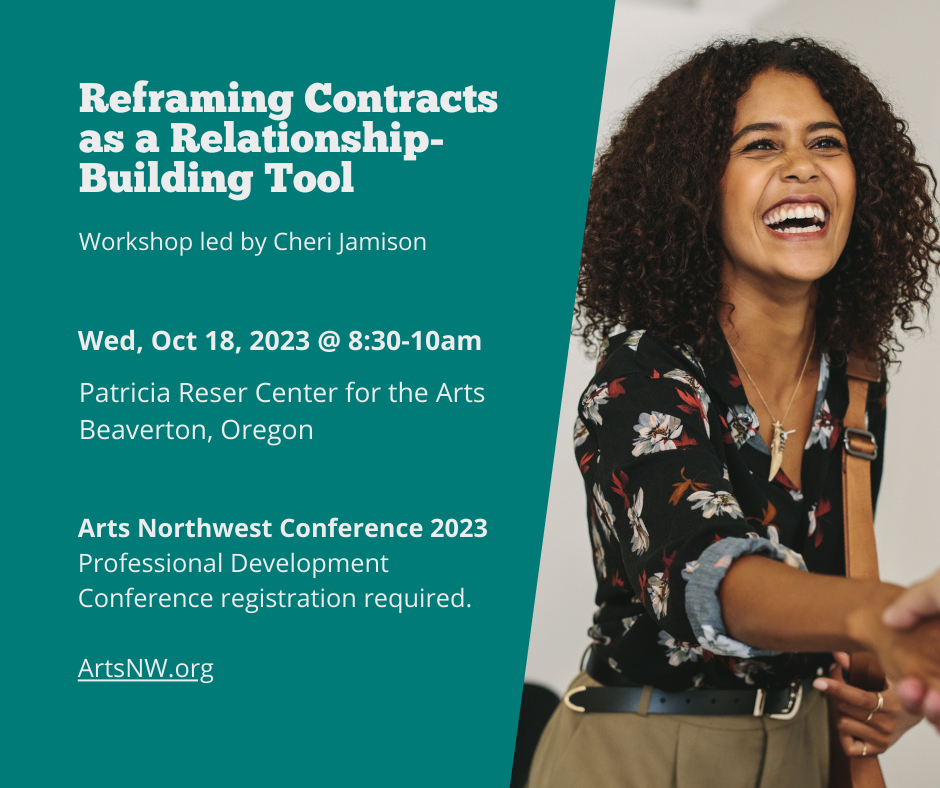|
In the world of performing arts, contracts are often viewed as boring but necessary legal documents, outlining the terms and conditions of a professional engagement. While they certainly serve this purpose, contracts can also be powerful tools for building and nurturing relationships within the industry.
As Vice President of Operations of a music booking agency, contracts were a huge part of my day-to-day work. I executed close to 450 contracts during the course of my two years with that company and a wide variety of deals for live performances (universities, performing arts centers, concert series, festivals, clubs, etc). Often, I'd have to negotiate or renegotiate with presenters to include greater protections or make the terms more balanced (e.g., with the Force Majeure clause) while also maintaining good professional relationships. I learned this was a key opportunity that, if done well, could deepen the relationship. In this article, we will explore how re-framing your mindset around contracts can transform these documents into invaluable instruments for fostering trust, strengthening interpersonal connections, and ultimately ensuring the long-term success of artists and organizations alike. The Traditional View of Contracts Traditionally, contracts have been seen as dry legalese, binding agreements designed primarily to protect the interests of both parties involved. They outline the obligations, responsibilities, and compensation for each party, leaving little room for flexibility or interpersonal considerations. This conventional approach often results in a transactional relationship, where artists and organizations interact out of necessity (or with uncomfortable power struggles) rather than genuine collaboration. 💡 Artists, if you don’t already have and use a standard contract, please do! It speaks volumes about your professionalism and how you run your business as a musician or artist group. Shifting the Paradigm To harness the full potential of contracts as relationship-building tools, it's essential to shift the paradigm. Instead of viewing contracts solely as legal documents, consider them the foundation upon which to build a robust, trusting, and mutually beneficial partnership. 1. Clear and Transparent Communication Effective interpersonal skills are at the core of successful contract negotiations. It begins with open and honest communication. Each party should have a clear understanding of their roles, expectations, and objectives. Take the time to engage in meaningful conversations, addressing concerns and questions openly. This fosters an environment of trust and understanding from the very beginning. 💡 Practical Tip: Presenters, if you know your contract has non-negotiable terms out of your control (common with government or university contracts) or requirements that may entail the artist having additional insurance, mention it in your conversations upfront or consider including a short bullet list in your deal memo before sending the full contract. This will give your counterpart a heads-up and build goodwill, even if there are terms you cannot change. 2. Collaborative Problem-Solving Negotiations and contracts often have an inherent tension because both sides are looking out for their own people, resources, etc. Instead of approaching these conversations and clauses with a combative mindset, view them as opportunities for collaborative problem-solving. Avoid manipulative sales tactics because most people can smell them a mile away. Be mindful of the tone you want to set in the conversation, and do your best to have a calm confident intention that you both will be able to work out a mutually beneficial solution. Most importantly, cultivate the mindset that the partnership is more important than any individual deal. “Don’t think of it as us vs. them,” as my friend and professional leadership coach, Lisa Husseini, describes negotiation, “but rather imagine you are both on the same side, standing shoulder to shoulder, turned in the same direction looking at the issue and asking yourselves, How do we make this work?” When conflicts arise, work together to find solutions that meet both parties' needs and maintain the integrity of the partnership. This approach can strengthen the bond between presenters, agents, artists and organizations. 3. Flexibility and Adaptability In the dynamic world of performing arts, unforeseen circumstances can disrupt even the most carefully planned engagements. As we witnessed during the COVID-19 pandemic, invoking the “Force Majeure” clause, where both parties cease all legal obligations if something happens outside anyone’s control that causes cancellation, can be absolutely devastating financially and to the relationship. Presenters, agents, and artists may discuss alternative provisions that allow for more flexibility and adaptability. This works best when included in the initial negotiation conversations rather than after receiving the initial contract document. You could approach it by talking about your organizational values or saying, “This is how we like to work with our partners when it comes to cancellation and Force Majeure circumstances.” When both parties are willing to accommodate reasonable changes, such as rescheduling or discussing what it would take to make each party whole, it demonstrates a commitment to the partnership's success rather than rigid adherence to contractual terms. 💡 Resource: Building Ethical and Equitable Partnerships in the Performing Arts, by the Association of Performing Arts Professionals (APAP). 4. Mutual Respect and Empathy One of the most powerful tools for building relationships is the practice of mutual respect and empathy. Recognize that artists and organizations are individuals with unique needs and aspirations. Show empathy by understanding their perspectives and challenges. This humanizes the contractual process, making it more about collaboration than compliance. The Trust-Building Continuum Building trust is a gradual process that extends far beyond the signing of a contract. A relationship-focused approach requires ongoing effort to nurture and maintain trust throughout the engagement. If you have a team, it’s important to train them because they are an extension of you in that partnership. Here are some strategies to consider: Consistent Communication Stay connected throughout the project, providing updates and feedback regularly. Make an effort to check in with each other and address any concerns promptly. Consistent communication demonstrates your commitment to the partnership's success. Deliver on Promises Meeting or exceeding the expectations outlined in the contract is crucial. When both parties consistently deliver on promises, trust deepens, and the relationship becomes more solidified. Celebrate Successes Acknowledge and celebrate milestones and achievements together. These moments of shared success can strengthen the emotional connection between artists and organizations. Learn from Challenges When challenges arise, view them as opportunities to learn and grow together. A relationship built on trust can withstand setbacks and become even stronger through adversity. In conclusion, re-framing contracts as a relationship-building tool can revolutionize how presenters, agents, and artists collaborate. But we can’t wait for others to do it. Change begins with our own commitment. Start within your own business or organization by updating your own contract with more equitable language and talking to your professional partners about why you’re making those changes from a values-led place. This shift not only enhances the quality of artistic productions but also creates a supportive, thriving, and more equitable ecosystem within the performing arts community. In our relationship-based industry, let's use every interaction—especially contracts—as a way to showcase our professionalism and strengthen our connections. *** This article is inspired by a workshop that Cheri will be presenting at the 2023 Arts Northwest Conference on Wednesday, Oct 18, 2023. For more information on the conference, please visit: artsnw.org/workshops |
AuthorCheri Jamison is an Arts Consultant with over 13 years of experience in arts and nonprofit management. Cheri Jamison Consulting LLC focuses on strengthening organizations through capacity-building, executive coaching, board training, and professional development. www.CheriJamison.com Categories
All
|


 RSS Feed
RSS Feed